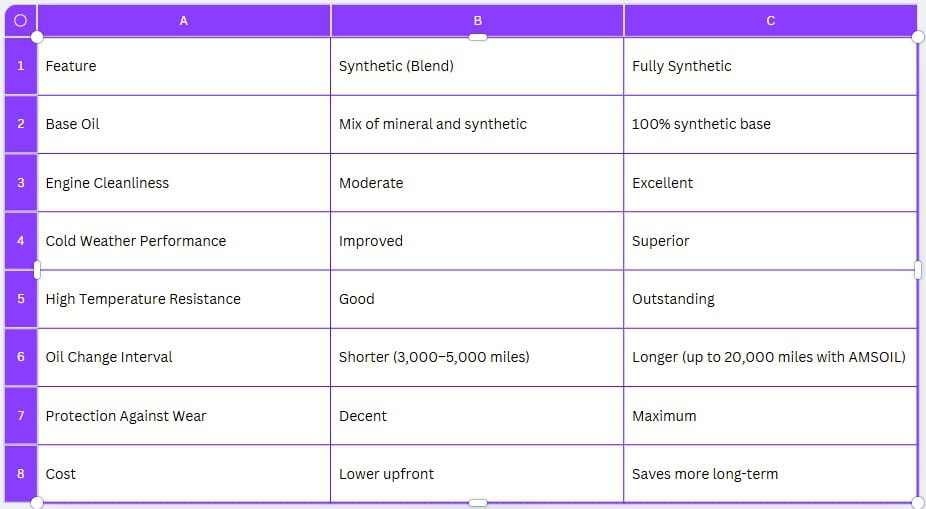While blends are a step up from conventional motor oils, not oil synthetic, they’re still a compromise. If you want complete engine protection, especially for high-performance or daily-driven vehicles, fully synthetic is the way to go.
My Experience with Different Oil Brands
Over the years, I’ve used a range of oils from well-known brands. Many claimed to be “full synthetic,” but their performance didn’t live up to expectations. Oil changes came sooner, and engine noise returned after a few thousand miles.
When I switched to AMSOIL, I noticed the difference immediately:
- Engines ran smoother and cooler
- Oil stayed clean longer
- Cold starts became easier
- Full year or 20,000 miles without an oil change
That kind of performance saves time and money, especially if you drive frequently or just want peace of mind.
Not All Fully Synthetic Oils Are Equal
Here’s what many drivers don’t know: Some oils labeled “full synthetic” still use modified mineral oil as their base (Group III). These are better than conventional oils but not true synthetics.
AMSOIL uses true synthetic base stocks (Group IV and V), offering better protection, especially in extreme heat or cold. It’s made to outperform—not just meet—industry standards.
Why I Recommend AMSOIL
After testing several brands, I stick with AMSOIL for a few key reasons:
- It protects engines better than anything else I’ve tried
- It reduces the need for frequent oil changes
- It prevents costly repairs and extends engine life
Whether you drive a car, truck, motorcycle, or ATV, AMSOIL delivers dependable performance and real long-term savings.
Explore Amsoil Products
Is Fully Synthetic Worth the Extra Cost?
It may cost more upfront, but it can save you money in the long run by:
- Extending engine life
- Reducing fuel consumption
- Allowing longer intervals between oil changes
Fewer oil changes also mean fewer service appointments, more convenient and often cheaper over time.
Can You Mix Synthetic and Fully Synthetic Oil?
Yes, you can, but it’s not ideal. Mixing won’t harm your engine in most cases, but it may reduce the performance benefits of a fully synthetic oil. Always check your owner’s manual and try to stick to one type.
How to Know What Type of Synthetic Oil You’re Buying?
Oil labeling can be confusing. Just because a bottle says “synthetic” doesn’t guarantee it’s fully synthetic.
Here’s what to look for:
- Check the spec sheet or product data sheet (PDS) for base oil group. Fully synthetic oils usually mention Group IV (PAO) or Group V (esters).
- Look for labels that clearly state “PAO-based,” “100% synthetic,” or “Full Synthetic” from trusted brands.
- Some bottles will mention certifications like API SP, ILSAC GF-6, or “meets/exceeds manufacturer requirements,” which helps confirm quality.
- For example, AMSOIL Signature Series 5W-30 clearly lists its extended performance capabilities and mentions its 100% synthetic formulation right on the bottle and product page.
I personally rely on Amsoil Signature Series Synthetic Motor Oil—especially for extreme climates. It provides reliable protection, smoother starts, and longer intervals.
Oil labeling can be confusing. Just because a bottle says “synthetic” doesn’t guarantee it’s fully synthetic. Here’s what to look for:
- Check the spec sheet for base oil group (Group IV or PAO is fully synthetic)
- Look for words like “PAO-based” or “100% synthetic.”
- Brands like Amsoil, Mobil 1 EP, and Red Line often use Group IV/V
I personally rely on Amsoil Signature Series Synthetic Motor Oil—especially for extreme climates. It provides reliable protection, smoother starts, and longer intervals.
Group III vs Group IV/V: Why It Matters
Group III oils may be marketed as synthetic, but they’re not true synthetics in terms of structure. They are:
- Hydrocracked mineral oils
- Made to perform better than conventional oils
Group IV (PAO) and Group V (Esters) are:
- Fully man-made
- Deliver superior performance in viscosity, volatility, and wear protection
Does Fully Synthetic Oil Last Longer?
Yes, fully synthetic oil generally lasts longer because of its advanced molecular structure and resistance to breakdown. Many high-end synthetics like Amsoil offer extended drain intervals up to 25,000 miles or 1 year under normal driving conditions. Always refer to your owner’s manual and consider your driving habits.
Is Fully Synthetic Oil Better for New Cars?
Absolutely. Modern engines are built to tighter tolerances and often run hotter. Fully synthetic oil offers the best protection, cleanliness, and efficiency for today’s high-tech engines, especially turbocharged and direct-injection systems.
Which Oil Should You Use?
- Every day commuter? A high-quality Group III synthetic may be fine.
- Live in a region with extreme heat or cold? Go fully synthetic.
- Drive high-mileage, turbocharged, or performance cars? Choose a PAO-based full synthetic.

